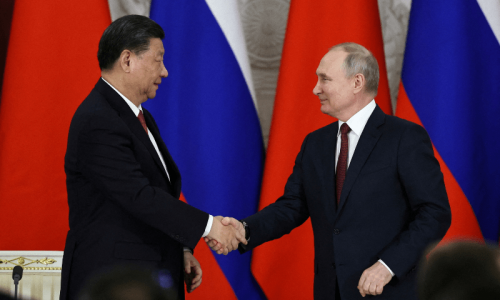WASHINGTON: President Obama pulled off a master stroke this week. He deployed US military force in support of an infant democracy that desperately needs help. The result was a resounding success, a vivid illustration of how the US can put its unchallenged power to positive ends.
He did it, once again, by sending in the SEALs, the US Navy’s famous special forces. But this time they weren’t double-tapping a terrorist. Instead they seized a mysterious tanker that had skipped out of Libya with a shipment of oil that one of the country’s rogue militias was trying to sell on the open market. By doing it the SEALs foiled a potentially game-changing challenge to the authority of Libya’s hard-pressed government — one of the very few in the Arab world to have actually been elected by its own country’s people.
The reaction in Washington: a giant yawn. Deafening silence from Senators John McCain and Lindsey Graham, who are always quick to demand US military action in situations where it will usually make things worse. Fox News barely noticed. Nor was there a word of praise from the president’s liberal allies on Capitol Hill. The collective disinterest is even more appalling when you consider that the country we just helped is Libya. You remember, right — the place where our ambassador was killed by terrorists two years ago? The president’s critics never tire of bringing that up, since they can use it to score political points against him — and especially against Hillary Clinton, who was on watch as the secretary of state during the Benghazi attack, and is the odds-on favourite as the Democratic candidate for president come 2016. This probably explains why you aren’t going to hear any Republicans spare a good word for Obama’s latest triumph.
Libya is in urgent need of help. The post-Qadhafi government, chosen by the people in free and fair elections, is struggling to survive challenges to its power from myriad armed militias, Islamist death squads, and regional separatists. All of these forces share an interest in keeping the central government destabilised and weak.
Recently, the biggest challenge to the central government’s authority has come from so-called “federalists,” armed groups who are demanding far-reaching autonomy for Cyrenaica, Libya’s easternmost region. The federalists, led by Ibrahim Jathran, don’t seem to be especially interested in negotiating with the government in Tripoli; instead they’ve tried to blackmail it into accepting their demands by seizing oil installations in the region and declaring that they’re going to sell off the resources under their control.
Oil is Libya’s lifeblood. The economy entirely depends on it. Libyans quite rightly regard the oil as their common property, a national resource to be shared for the good of all. The vast majority of Libyans hold jobs that are financed, directly or indirectly, by the sale of oil. Given this history, it makes perfect sense that the control of oil should rest with the central government. Take that away, and the government doesn’t just lose control over its most important source of finance — the very notion of central authority will also be compromised, perhaps fatally.
This is why both Libya’s government and the international community have viewed the federalists’ threats to sell off the oil under their control as a dangerous challenge to the stability of the government in Tripoli. Last week, Jathran’s forces finally made good on that threat: they used one of the oil terminals under their control to fill up a North Korean-flagged tanker called the Morning Glory. The tanker then sailed out into the Mediterranean, defying warnings from the central government that it would deploy its naval forces to block the ship from leaving the port. No such action was forthcoming, of course. The security forces of current Libyan government can’t even maintain control over its own capital, much less over the country’s coastal waters. Had the story ended there, the result would have been an unmitigated disaster for the government. The floodgates for the wholesale looting of Libya’s oil resources would have opened. But that’s when Washington stepped in. Not long after the tanker arrived in international waters, a US Navy guided missile cruiser, the USS Roosevelt, brought the SEALs into range. They boarded the tanker without a shot fired and took it over. The oil is now on its way back to territory controlled by Tripoli. The Libyan government asked the US for its help — which helps to explain why this display of US military force has been greeted with the almost unanimous approval of the international community. But that’s not the only reason.
Everyone has an interest in seeing Libya, a big country in a strategically sensitive part of the world, develop a stable and durable government. Make no mistake: This was not “leading from behind.” This was an act of daring from a president who’s often typecast as too passive for his own good. But it was also a smart, calculated move — a truly surgical operation of a kind that probably only the US could have pulled off with such confidence. It sends exactly the message that needs to be sent: if you try freelancing with oil resources that rightfully belong to the Libyan people, you won’t get far.
Everyone’s understandably preoccupied with the crisis in Ukraine. But surely striking a blow for the cause of Arab democracy deserves our attention — and it’s a cause that is facing more than its share of problems these days. Libya matters, too.
—By arrangement with Foreign Policy-The Washington Post











































Dear visitor, the comments section is undergoing an overhaul and will return soon.